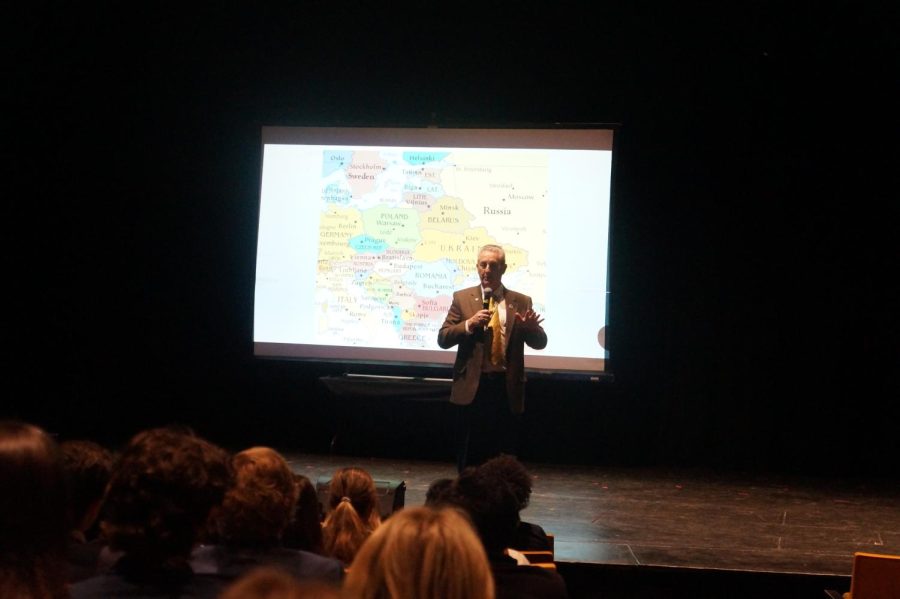Lt. Gen. Ramsay educates students about Russian invasion of Ukraine
March 24, 2022
JC 1977 graduate Lt. Gen. Mark F. Ramsay spoke to members of the student body who were sitting in the same seats he sat in 45 years ago.
Since his time at JC, he entered the Air Force in 1982 as a distinguished graduate from the Officer Training School and Undergraduate Pilot Training.
He also served as Deputy Director of Politico-Military Affairs for Europe, Russia, and Africa on the Joint Staff, Director of Air Force Strategic Planning at Headquarters U.S. Air Force, and the Deputy Chief of Staff, Operations and Intelligence, Supreme Headquarters Allied Powers Europe, NATO, Casteau, Belgium.
Finally, Lieutenant General Ramsay served as a mentor to senior NATO leaders in the conduct of Allied planning and operations from 2015 to 2021.
Taking all this experience on international affairs, Lieutenant General Ramsay has the background to speak to students and faculty regarding the conflict in Ukraine with Russia because “it matters.”
To begin the presentation, Lieutenant General Ramsay showed a map of Europe while providing historical background to the turmoil that existed with Russia and surrounding countries.
He explained the beginning of the Cold War all the way to the collapse of the Soviet Union.“Nationalistically, the Russians love to dominate,” said Lieutenant General Ramsay.
To further comprehend the complicated matter, Lieutenant General Ramsay gave a timeline and description of the events following Russian President Vladimir Putin’s takeover and interactions between the EU, NATO, the US, and specifically Ukraine.
Lieutenant General Ramsay said, “In 2007, Putin gave a speech to the EU, warning the US of the implications of NATO encroaching West. . . However, “Ukraine, being in the West, signed a US partnership that stated they will eventually be a part of NATO.”
Additionally, Lieutenant General Ramsay broke down some of the “most important aspects of international affairs” by reviewing the acronym “DIME:” D for diplomacy, I for information, M for military, and E for economics.
After providing additional details about the acronym, Lieutenant General Ramsay answered student questions. One included, “How do we know what to read and where?”
Lieutenant General Ramsay advised students not to watch American TV and to watch international TV such as the BBC instead. No matter where people get information from, he wanted to emphasize how “important it is to always look at multiple perspectives and think critically.”
He also touched on the dangers of disinformation, especially amidst Russian propaganda. He said, “In order to critically think, there needs to be critical communication.”
Sophomore Haley Lauer said, “I had lots of questions regarding the military operations going on between Russia and Ukraine. He really cleared up a lot of confusion I had when he went over the ‘M’ in the ‘DIME’ acronym.”
In regard to the military, Lieutenant General Ramsay showed the map of Russia and Ukraine in proximity to the Black Sea. In order to build the Russian naval base, they have taken over the Ukrainian coast of Mariupol and Odesa. As Russian forces continue to encroach on the main capital and cities in Ukraine, the probability of an active war increases.
Lieutenant General Ramsay said, “There are many reasons to not go to war. It’s expensive; there will be collateral damage, and it’s difficult to reverse war once it’s been put into effect. . . But I don’t know how you end this type of tension in a peaceful way. I wish I had that answer.”
Another question that was asked was “How will the US see these changes?”
Lieutenant General Ramsay said, “We’re experiencing the effects of the Ukraine and Russia conflict now. Russia is rich in critical minerals and provides 10% of the world’s gas… Putin has already shut down the Federal Reserves.”
This means gas prices will continue to rise, and receiving necessities from these countries will be “difficult to impossible.” This is why student should be “seeing how this is impacting the US and will continue to which is why even young students should care.”
Lieutenant General Ramsay hopes that he “got to explain and give students a better understanding of the importance of the conflict.”



